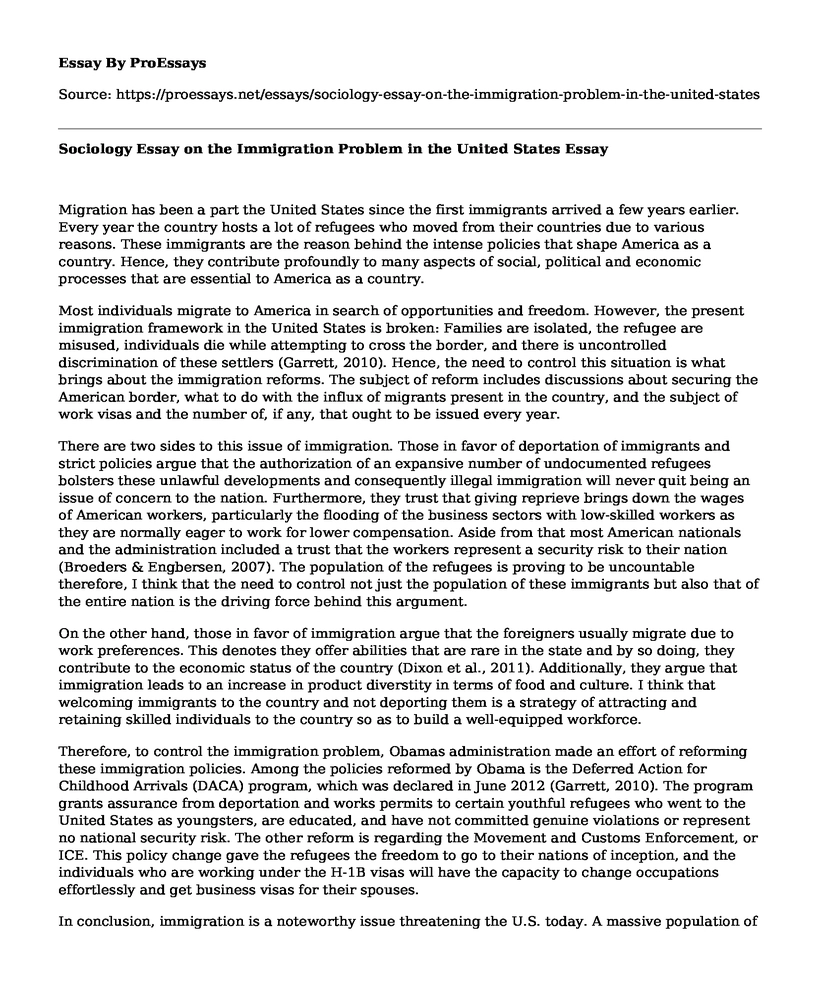Migration has been a part the United States since the first immigrants arrived a few years earlier. Every year the country hosts a lot of refugees who moved from their countries due to various reasons. These immigrants are the reason behind the intense policies that shape America as a country. Hence, they contribute profoundly to many aspects of social, political and economic processes that are essential to America as a country.
Most individuals migrate to America in search of opportunities and freedom. However, the present immigration framework in the United States is broken: Families are isolated, the refugee are misused, individuals die while attempting to cross the border, and there is uncontrolled discrimination of these settlers (Garrett, 2010). Hence, the need to control this situation is what brings about the immigration reforms. The subject of reform includes discussions about securing the American border, what to do with the influx of migrants present in the country, and the subject of work visas and the number of, if any, that ought to be issued every year.
There are two sides to this issue of immigration. Those in favor of deportation of immigrants and strict policies argue that the authorization of an expansive number of undocumented refugees bolsters these unlawful developments and consequently illegal immigration will never quit being an issue of concern to the nation. Furthermore, they trust that giving reprieve brings down the wages of American workers, particularly the flooding of the business sectors with low-skilled workers as they are normally eager to work for lower compensation. Aside from that most American nationals and the administration included a trust that the workers represent a security risk to their nation (Broeders & Engbersen, 2007). The population of the refugees is proving to be uncountable therefore, I think that the need to control not just the population of these immigrants but also that of the entire nation is the driving force behind this argument.
On the other hand, those in favor of immigration argue that the foreigners usually migrate due to work preferences. This denotes they offer abilities that are rare in the state and by so doing, they contribute to the economic status of the country (Dixon et al., 2011). Additionally, they argue that immigration leads to an increase in product diverstity in terms of food and culture. I think that welcoming immigrants to the country and not deporting them is a strategy of attracting and retaining skilled individuals to the country so as to build a well-equipped workforce.
Therefore, to control the immigration problem, Obamas administration made an effort of reforming these immigration policies. Among the policies reformed by Obama is the Deferred Action for Childhood Arrivals (DACA) program, which was declared in June 2012 (Garrett, 2010). The program grants assurance from deportation and works permits to certain youthful refugees who went to the United States as youngsters, are educated, and have not committed genuine violations or represent no national security risk. The other reform is regarding the Movement and Customs Enforcement, or ICE. This policy change gave the refugees the freedom to go to their nations of inception, and the individuals who are working under the H-1B visas will have the capacity to change occupations effortlessly and get business visas for their spouses.
In conclusion, immigration is a noteworthy issue threatening the U.S. today. A massive population of refugees migrates to this nation consistently. Some legitimately, others wrongfully. Some are getting away from religious and political persecution while others come to search for a better life. Whichever way they are bringing about a national concern and it is essential that the government finds the most efficient policies to control this issue.
References
Broeders, D., & Engbersen, G. (2007). The fight against illegal migration: Identification policies and immigrants Counterstrategies. American Behavioral Scientist, 50(12), 15921609. doi:10.1177/0002764207302470
Dixon, P. B., Johnson, M., & Rimmer, M. T. (2011). ECONOMY-WIDE EFFECTS OF REDUCING ILLEGAL IMMIGRANTS IN U.S. EMPLOYMENT. Contemporary Economic Policy, 29(1), 1430. doi:10.1111/j.1465-7287.2010.00208.x
Garrett, T. M. (2010). The border fence, immigration policy, and the Obama administration. Administrative Theory & Praxis, 32(1), 129133. doi:10.2753/atp1084-1806320109
Cite this page
Sociology Essay on the Immigration Problem in the United States. (2021, Mar 29). Retrieved from https://proessays.net/essays/sociology-essay-on-the-immigration-problem-in-the-united-states
If you are the original author of this essay and no longer wish to have it published on the ProEssays website, please click below to request its removal:
- California Nut Theft Analysis Essay
- Providing High-Quality Food Services for Inmates in Detention or Correctional Facilities Proposal
- Essay on Confronting Toxic Behaviour: Overcome Fear, Strengthen Relationships.
- Essay Sample on Upper, Lower and Middle Class Peasants Collaborate to Fight Societal Vices in Fascist Era
- Asian Americans: The Model Minority in the 1960s Immigration Movement - Essay Sample
- Security Council & International Court of Justice: Crisis Management & Dispute Resolution - Essay Sample
- Paper Example on Colonel Bradford's Family Safety Priority During Plague







